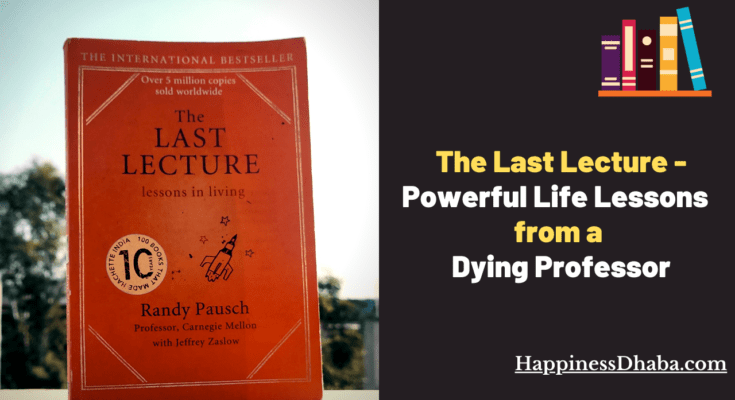Book – The Last Lecture
Author – Randy Pausch
Genre – Non-Fiction
As is our custom of writing about books, let’s begin with an enlightening quote from the book.
Time is all you have and one day you may realize you have less than you think.
About the Book:-
Randy Pausch was a professor of Computer Science, Human-Computer Interaction and Design at Carnegie Mellon University and this University was well-known for its ‘Last Lecture‘ series, a series in which professors were asked to impart words of wisdom to the students assuming it was their “last chance”.
But for Randy, there was no assumption involved. It was indeed going to be his Last Lecture, considering his immedicable illness.
After being diagnosed with Pancreatic Cancer, more than anything else, Randy was terrified at the fact that his three small children would only have vivid memories of their father when they are grown-ups.
So, when invited for The last lecture, Randy wanted to convert his last chance into something meaningful that could continue to serve as a good reference for his children growing up in his absence.
So, he gave the Lecture, “Really Achieving Your Childhood Dreams.” His feelings could be understood from the following words,
I was trying to put myself in a bottle that would one day wash up on the beach for my children. If I were a painter, I would have painted for them. But I am a lecturer, so I lectured.
Soon after the lecture concluded, Randy became an overnight star. His nerdy persona appealed to the masses as his lecture went viral on YouTube.
Though Randy lost his battle with cancer, his “lessons on living” won the internet and continue to be the guiding light for thousands like me.
Powerful Life-Lessons from a Dying Professor:
#1: Self-esteem is not given, it’s built:
You give them(students) something they can’t do, they work hard until they find they can do it, and you just keep repeating the process.
There’s a lot of debate these days about giving children self-esteem. Randy argued that It’s not something we can give: it’s something they have to build on their own. And professors and parents have a pivotal role in helping them do so. Citing an example of his childhood coach, Coach Graham, Randy advocated that it’s the parents and the professors who can infuse in children a perennial belief that if they work hard, they can do things tomorrow that they are not able to do today.
And this belief, if timely inculcated has the potential of being one of the most powerful breeding grounds for self-esteem.
Randy also advocated the importance of critics in building self-esteem. When you see yourself doing something badly and nobody is bothering to tell you, that’s a bad place to be. He believed that our critics are often the ones telling us that they still love us and want us to keep moving towards the summit.
#2: Learning through Head-Fake or Why participation is important:

When parents send their kids to play organized sports like football, soccer, swimming, etc, for most of them, it’s not that they’re desperate for them to learn the intricacies of the sport.
What they actually want is to make their children learn more important life skills such as teamwork. perseverance, sportsmanship, the value of hard work, and the ability to deal with adversity. This kind of indirect learning is what Randy used to call a Head-Fake.
As a matter of fact, we all have had goals in life that we failed to give the intended shape. but still, we can’t repudiate the importance of comforting effects produced by voyaging towards those goals.
Similarly, Randy designed a software project named Alice. Its apparent aim was to teach kids how to create video games and make animated movies. But its clandestine aim was to teach kids the fundamentals of computer programming without them even realizing it.
This book, in itself, is a perfect example of a head fake. The title of the book reads, it’s about how to achieve your dreams, but as is revealed by Randy at the end of the book, it’s about “how to lead your life.” Randy believed that if we can lead our life with a well-defined plan of action then we don’t need to worry about our dreams. Our plan will take care of our dreams.
#3: Never Give Up
The brick walls are there for a reason. They’re not there to keep us out. The brick walls are there to give us a chance to show how badly we want something.

We all often feel like giving up when faced with a back-breaking situation. Contrarily, Randy believed that problems are a kind of filtering mechanism to separate the wheat from the chaff.
Isn’t that an on-point answer?
We all have problems – small or large – the only difference is our attitude towards them. The biggest mistake people make is that they yearn for a life without problems. It’s clearly a preposterous goal and even if we assume it can be realized. It will only result in an utterly monotonous life.
The reality is that it’s the problem-solving skill that can actually help us ease our sufferings and the irony is that it can only be mastered by smashing ourselves into the brick wall i.e. by being face to face with the problem.
#4: Don’t Repair things if they still do what they’re supposed to do.
My parents had raised me to recognize that automobiles are there to get you from point A to B. They are utilitarian devices, not expressions of social status.

And that’s really one of the most important lessons. We all have seen people going broke in trying to look rich. Though Randy had used it in a different context, in my opinion, it’s one of the greatest financial advice one can get. If you look at rich people away from showbiz, you will find they are a different breed. They think differently. They act differently. They spend differently.
They don’t dress in expensive and flamboyant clothes, because they’re smart. They know the importance of money and hence don’t believe in spending heavily on something as ephemeral as clothes. They instead save to invest in stocks, real estate, or to start a business. And that is what makes them rich.
That’s something very well explained in the book Rich Dad Poor Dad by Robert Kiyosaki. Escaping the trap of the consumer mindset propagated by the advertising culture is really an uphill task. Falling prey to it, the pseudo-rich people “invest” their money in personal possessions while the really rich ones focus on acquiring assets.
#5: Use your Time wisely:
Time is all you have and one day you may realize you have less than you think.
Randy encouraged students to refrain from investing too much time in irrelevant details. He used to say, it doesn’t matter how well you polish the underside of the banister.
And that’s so true. We all waste so much time on trivial things, We waste our precious time watching senseless web-shows, following and fighting over celebrities and petty politicians we don’t even know in real life and will most probably never get to know. All these things even after knowing that we have limited time.
I often feel that Time is the most under-valued currency known to humans. In fact, we don’t even consider it to be a currency.
To corroborate my argument let me quote, Cal Newport in the book Digital Minimalism,
The cost of a thing is the amount of what I will call life which is required to be exchanged for it, immediately or in the long run.
#6: A Professor’s job is equivalent to that of a trainer at a Gym

Image by athree23 from Pixabay
Randy compared the job of a professor to that of a trainer in the gym. When working out at a gym, if we put in sincere efforts, we are bound to see encouraging results. And these results in turn reinforce in us a belief that we are on the right path which in turn gives us the much-needed impetus towards our end goal.
Similarly. a professor’s job is to help students see their minds growing when they are putting in hard work. Failing which, the students might not remain motivated enough towards putting in sustained efforts.
#7: Relationship advice for young girls:
When it comes to men who are romantically interested in you, it’s really simple. Just ignore everything they say and only pay attention to what they do.
That’s another gem of advice from Randy. We, humans, are designed to run on habits. As a result, our decisions are governed more by this default setting than by rational thoughts. To change even one of our habits, we need to put in a lot of effort. And that’s where this trick of Randy comes in handy.
In this world full of impersonators, anyone can pretend to be anything. But inculcating those great values is always going to take a lot of time. So, the true self of an individual is always there to be seen in their actions. All you need to do is ignore everything they say and focus on their actions.
Also Read: Relationship Advice for Young Girls from Randy’s Last Lecture
#8: An Award for Glorious Failure:
Experience is what you get when you don’t get what you wanted

Randy believed that the person who failed often knows how to avoid future failures. The person who knows only success can be more oblivious to all the pitfalls. Following this principle, Randy encouraged students to attempt hard things and not worry about failure.
To encourage students to take chances and be fearless in their thinking, he invented an award called, “The first Penguin Award”. At the end of each semester, he’d give it to the team that took the biggest gamble in trying new ideas, while failing to achieve their stated goal.
In a world, where everyone was busy worshipping the rising stars, Randy was busy changing students’ perspectives toward failure.
#9: Genius is explaining complex tasks in a simple way.
When we make something hard to use, people get upset. They become so angry that they want to destroy it. We don’t want to create things that people will want to destroy.
Randy believed that most engineers and computer scientists didn’t always think about the ease of use for the end-users while designing a product. And that’s because most of us are terrible at explaining complex things in simpler ways.
To corroborate the importance of creating technology that isn’t frustrating to use, he came up with an idea. On the first day of his User-Interface class at the University of Virginia, he’d bring in a working VCR. He would put it on a desk and destroy it with a hammer.
This act of Randy would stick around in the minds of the future designers(the students) thus engraving in them the importance of ease of use for the frustrated masses, yearning for simplicity.
My Favorite part:
The blurb of the book reads,
If you only had a short time to live, what would you do?
Randy acknowledged the fact that he was lucky enough for having received an advance notice of his death which in turn wouldn’t have been possible if his fate had been a heart attack or a car accident.
It had not only given him time to have vital conversations with his wife but also given him the liberty to say goodbye to those who meant so much to him.
In his words, it helped him in leaving the field in his own power.
These words, coming from a terminally ill, middle-aged man and that too at the peak of his career, really hit me hard.
Who should read “The Last Lecture?”
- People who are feeling dejected due to any reason.
- A perfect read for people interested in real-life heroes.
- The Dreamers, who are working hard to fulfil their dreams.
- The Fighters, who are suffering from some terminal illness.
- All the great professors who want to be “the best” at their job.
Grab your copy here from Amazon.in | Amazon.com
I hope you loved reading the review and enjoyed the lessons too. It’s one of those books that every non-fiction lover must check out.
The Best Books:
Recommended Reading Lists
1. Best Books To Help You Develop the HABIT of READING
2. Best Books That Teach the Art of Living a HAPPIER LIFE
3. Best Books on STOCK MARKET & INVESTING
4. Best Books To Help You Find HOPE During Your Darkest of Times
That’s all we have for today. Thanks a lot for tuning in to HappinessDhaba. Do let us know your views on this in the comment section.
Signing off with my favorite words.
Zindagi Zindabad!
Author Profile

Recent Posts
 The Punjabi LiteratureJuly 14, 2025Paash on the Death of Dreams ― Sab Ton Khatarnak
The Punjabi LiteratureJuly 14, 2025Paash on the Death of Dreams ― Sab Ton Khatarnak Blog PostsApril 6, 2025Rebuilding Identity After The Self Falls Apart | by Jasmeet
Blog PostsApril 6, 2025Rebuilding Identity After The Self Falls Apart | by Jasmeet Book Summaries & LessonsFebruary 6, 2025BURN IT ALL: Kafka’s Legacy and the Friendship That Saved It
Book Summaries & LessonsFebruary 6, 2025BURN IT ALL: Kafka’s Legacy and the Friendship That Saved It Life Through SongsJanuary 20, 20259 Best Punjabi Heer Ranjha Songs ― The Modern Playlist
Life Through SongsJanuary 20, 20259 Best Punjabi Heer Ranjha Songs ― The Modern Playlist









5 Comments on “The Last Lecture – 9 Powerful Lessons From A Dying Professor | HappinessDhaba”